IT Ethics: Ethical Implications of Driverless Trucks in Australia
VerifiedAdded on 2021/06/18
|7
|1700
|19
Essay
AI Summary
This essay delves into the ethical dilemma surrounding the potential widespread adoption of driverless trucks in Australia. It examines the potential job displacement of truck drivers and related industries, as well as the ethical considerations that arise from replacing human labor with autonomous technology. The essay applies four classical ethical theories—utilitarianism, deontology, virtue theory, and contract theory—to analyze the situation, ultimately concluding that the use of driverless trucks is ethically questionable due to its negative impact on employment and related businesses. The analysis highlights how different ethical frameworks lead to varying conclusions, emphasizing the complexity of navigating technological advancements and their societal consequences. The essay also underscores the importance of considering the broader impact on society and the need for careful evaluation before implementing such transformative technologies.
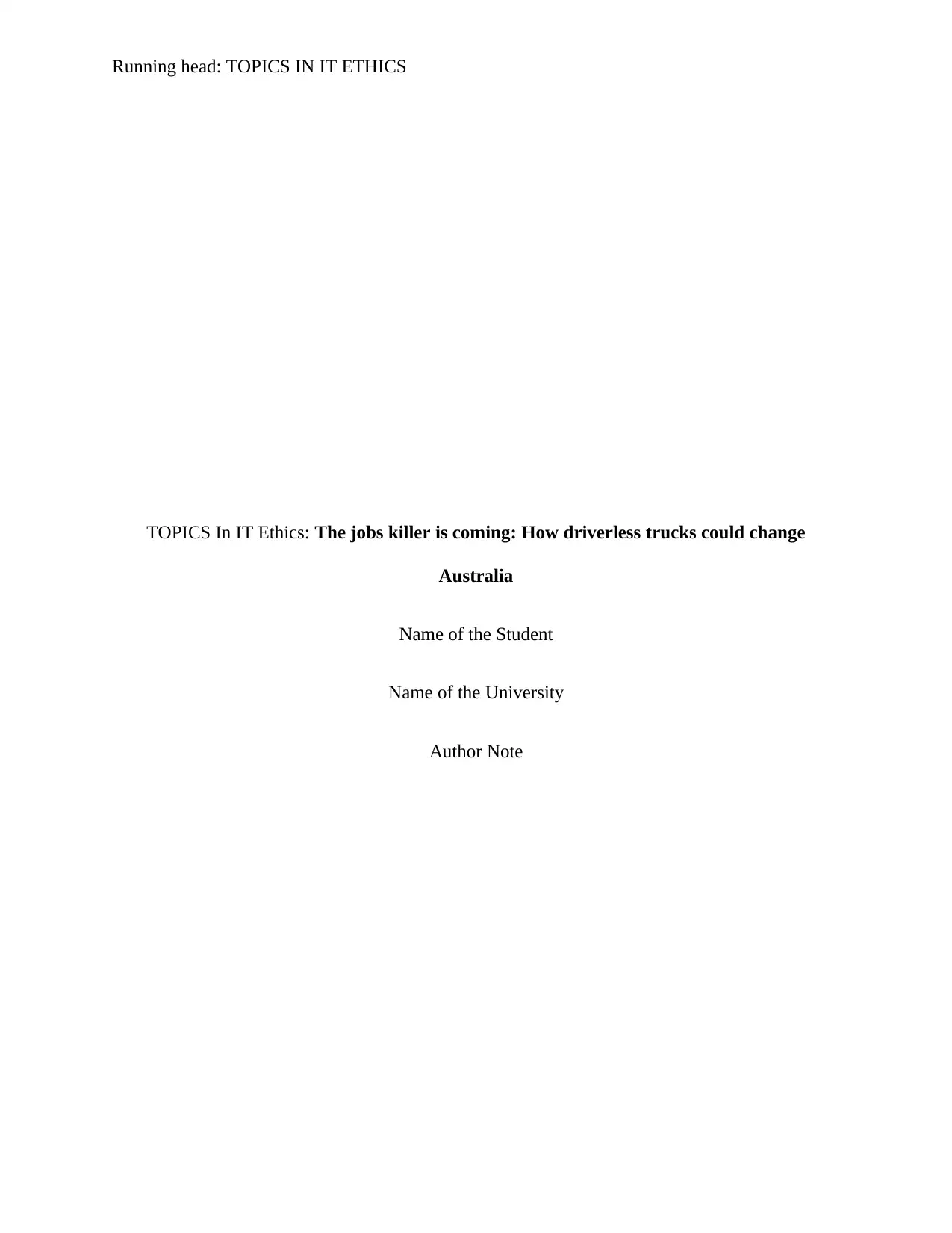
Running head: TOPICS IN IT ETHICS
TOPICS In IT Ethics: The jobs killer is coming: How driverless trucks could change
Australia
Name of the Student
Name of the University
Author Note
TOPICS In IT Ethics: The jobs killer is coming: How driverless trucks could change
Australia
Name of the Student
Name of the University
Author Note
Paraphrase This Document
Need a fresh take? Get an instant paraphrase of this document with our AI Paraphraser
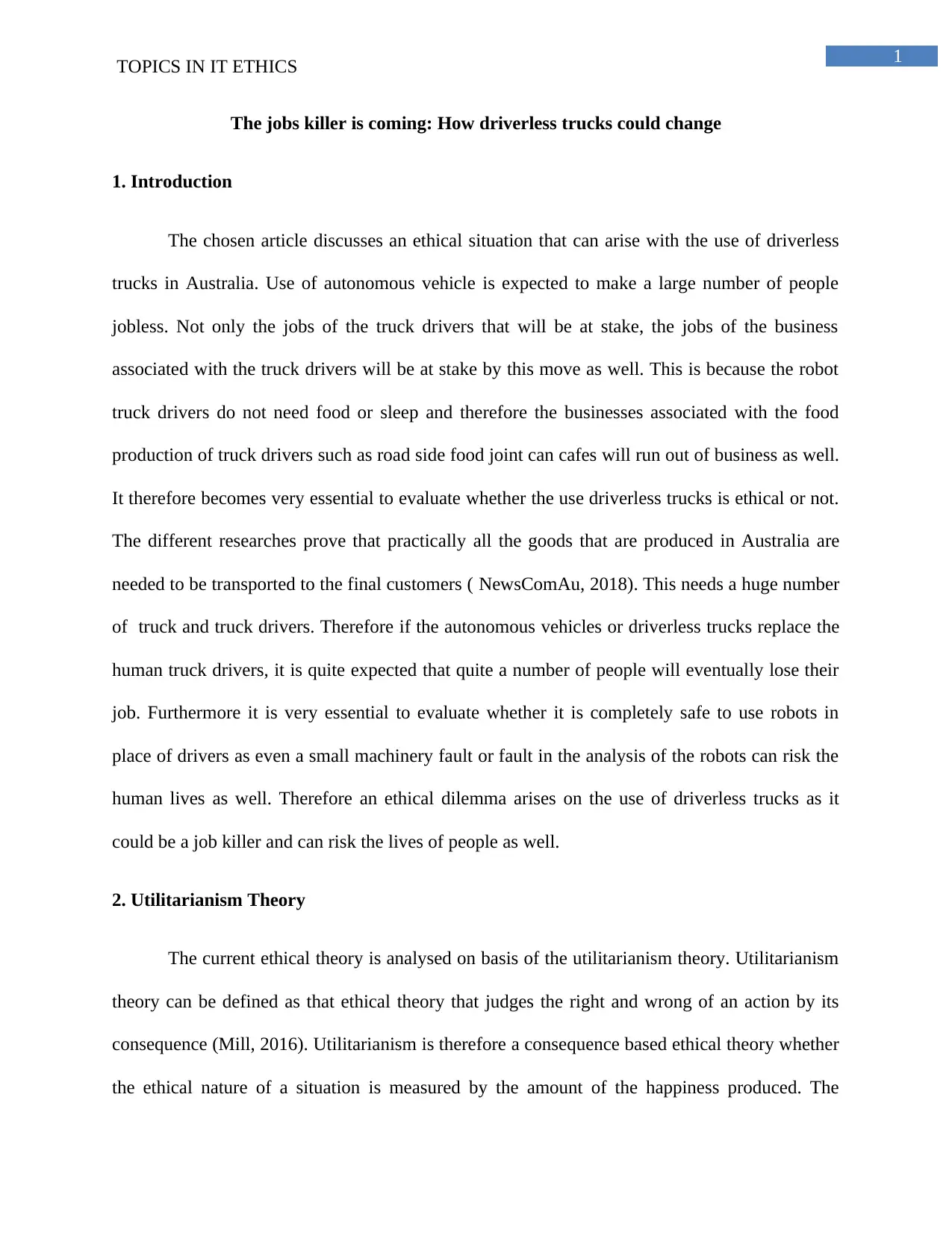
1
TOPICS IN IT ETHICS
The jobs killer is coming: How driverless trucks could change
1. Introduction
The chosen article discusses an ethical situation that can arise with the use of driverless
trucks in Australia. Use of autonomous vehicle is expected to make a large number of people
jobless. Not only the jobs of the truck drivers that will be at stake, the jobs of the business
associated with the truck drivers will be at stake by this move as well. This is because the robot
truck drivers do not need food or sleep and therefore the businesses associated with the food
production of truck drivers such as road side food joint can cafes will run out of business as well.
It therefore becomes very essential to evaluate whether the use driverless trucks is ethical or not.
The different researches prove that practically all the goods that are produced in Australia are
needed to be transported to the final customers ( NewsComAu, 2018). This needs a huge number
of truck and truck drivers. Therefore if the autonomous vehicles or driverless trucks replace the
human truck drivers, it is quite expected that quite a number of people will eventually lose their
job. Furthermore it is very essential to evaluate whether it is completely safe to use robots in
place of drivers as even a small machinery fault or fault in the analysis of the robots can risk the
human lives as well. Therefore an ethical dilemma arises on the use of driverless trucks as it
could be a job killer and can risk the lives of people as well.
2. Utilitarianism Theory
The current ethical theory is analysed on basis of the utilitarianism theory. Utilitarianism
theory can be defined as that ethical theory that judges the right and wrong of an action by its
consequence (Mill, 2016). Utilitarianism is therefore a consequence based ethical theory whether
the ethical nature of a situation is measured by the amount of the happiness produced. The
TOPICS IN IT ETHICS
The jobs killer is coming: How driverless trucks could change
1. Introduction
The chosen article discusses an ethical situation that can arise with the use of driverless
trucks in Australia. Use of autonomous vehicle is expected to make a large number of people
jobless. Not only the jobs of the truck drivers that will be at stake, the jobs of the business
associated with the truck drivers will be at stake by this move as well. This is because the robot
truck drivers do not need food or sleep and therefore the businesses associated with the food
production of truck drivers such as road side food joint can cafes will run out of business as well.
It therefore becomes very essential to evaluate whether the use driverless trucks is ethical or not.
The different researches prove that practically all the goods that are produced in Australia are
needed to be transported to the final customers ( NewsComAu, 2018). This needs a huge number
of truck and truck drivers. Therefore if the autonomous vehicles or driverless trucks replace the
human truck drivers, it is quite expected that quite a number of people will eventually lose their
job. Furthermore it is very essential to evaluate whether it is completely safe to use robots in
place of drivers as even a small machinery fault or fault in the analysis of the robots can risk the
human lives as well. Therefore an ethical dilemma arises on the use of driverless trucks as it
could be a job killer and can risk the lives of people as well.
2. Utilitarianism Theory
The current ethical theory is analysed on basis of the utilitarianism theory. Utilitarianism
theory can be defined as that ethical theory that judges the right and wrong of an action by its
consequence (Mill, 2016). Utilitarianism is therefore a consequence based ethical theory whether
the ethical nature of a situation is measured by the amount of the happiness produced. The
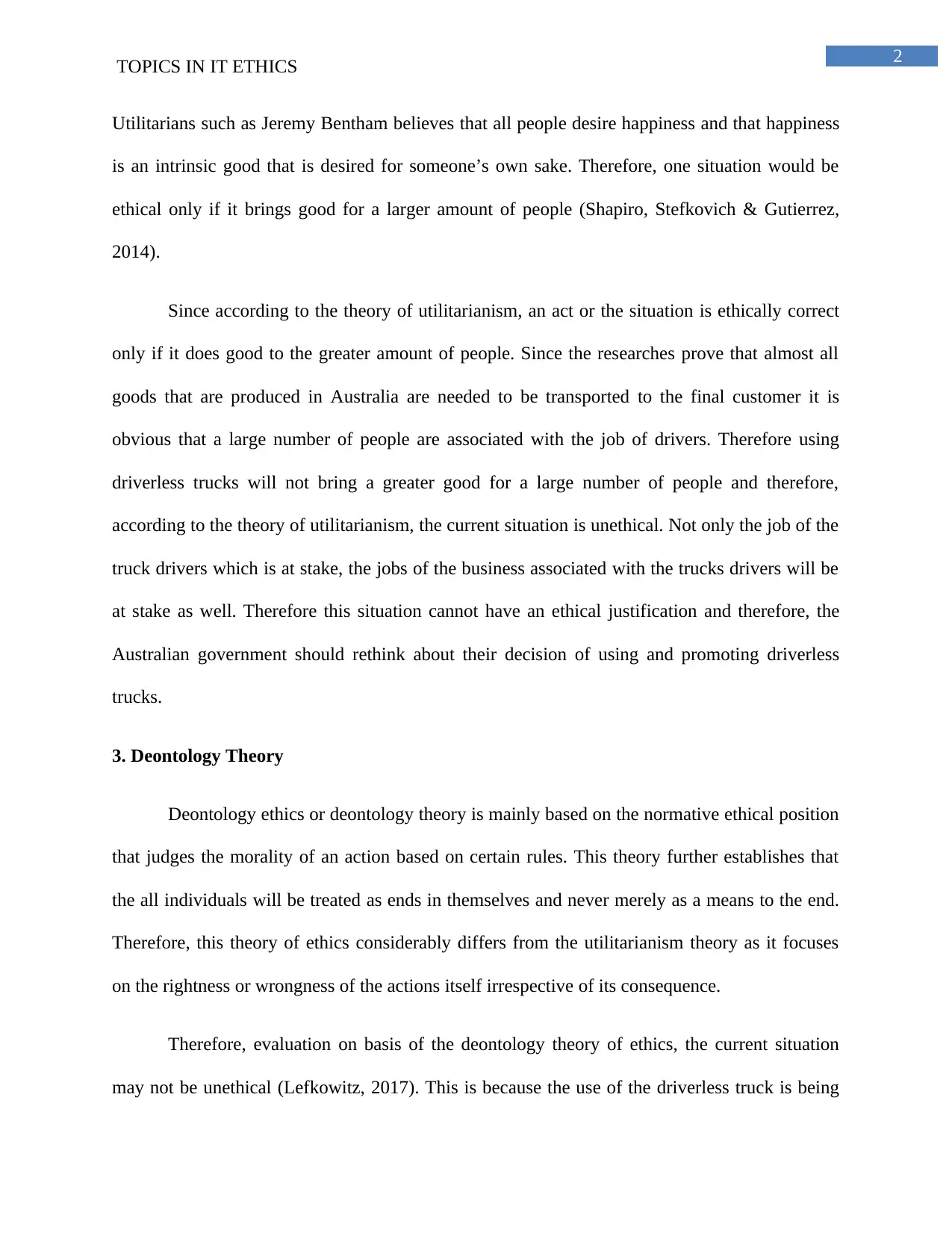
2
TOPICS IN IT ETHICS
Utilitarians such as Jeremy Bentham believes that all people desire happiness and that happiness
is an intrinsic good that is desired for someone’s own sake. Therefore, one situation would be
ethical only if it brings good for a larger amount of people (Shapiro, Stefkovich & Gutierrez,
2014).
Since according to the theory of utilitarianism, an act or the situation is ethically correct
only if it does good to the greater amount of people. Since the researches prove that almost all
goods that are produced in Australia are needed to be transported to the final customer it is
obvious that a large number of people are associated with the job of drivers. Therefore using
driverless trucks will not bring a greater good for a large number of people and therefore,
according to the theory of utilitarianism, the current situation is unethical. Not only the job of the
truck drivers which is at stake, the jobs of the business associated with the trucks drivers will be
at stake as well. Therefore this situation cannot have an ethical justification and therefore, the
Australian government should rethink about their decision of using and promoting driverless
trucks.
3. Deontology Theory
Deontology ethics or deontology theory is mainly based on the normative ethical position
that judges the morality of an action based on certain rules. This theory further establishes that
the all individuals will be treated as ends in themselves and never merely as a means to the end.
Therefore, this theory of ethics considerably differs from the utilitarianism theory as it focuses
on the rightness or wrongness of the actions itself irrespective of its consequence.
Therefore, evaluation on basis of the deontology theory of ethics, the current situation
may not be unethical (Lefkowitz, 2017). This is because the use of the driverless truck is being
TOPICS IN IT ETHICS
Utilitarians such as Jeremy Bentham believes that all people desire happiness and that happiness
is an intrinsic good that is desired for someone’s own sake. Therefore, one situation would be
ethical only if it brings good for a larger amount of people (Shapiro, Stefkovich & Gutierrez,
2014).
Since according to the theory of utilitarianism, an act or the situation is ethically correct
only if it does good to the greater amount of people. Since the researches prove that almost all
goods that are produced in Australia are needed to be transported to the final customer it is
obvious that a large number of people are associated with the job of drivers. Therefore using
driverless trucks will not bring a greater good for a large number of people and therefore,
according to the theory of utilitarianism, the current situation is unethical. Not only the job of the
truck drivers which is at stake, the jobs of the business associated with the trucks drivers will be
at stake as well. Therefore this situation cannot have an ethical justification and therefore, the
Australian government should rethink about their decision of using and promoting driverless
trucks.
3. Deontology Theory
Deontology ethics or deontology theory is mainly based on the normative ethical position
that judges the morality of an action based on certain rules. This theory further establishes that
the all individuals will be treated as ends in themselves and never merely as a means to the end.
Therefore, this theory of ethics considerably differs from the utilitarianism theory as it focuses
on the rightness or wrongness of the actions itself irrespective of its consequence.
Therefore, evaluation on basis of the deontology theory of ethics, the current situation
may not be unethical (Lefkowitz, 2017). This is because the use of the driverless truck is being
⊘ This is a preview!⊘
Do you want full access?
Subscribe today to unlock all pages.

Trusted by 1+ million students worldwide
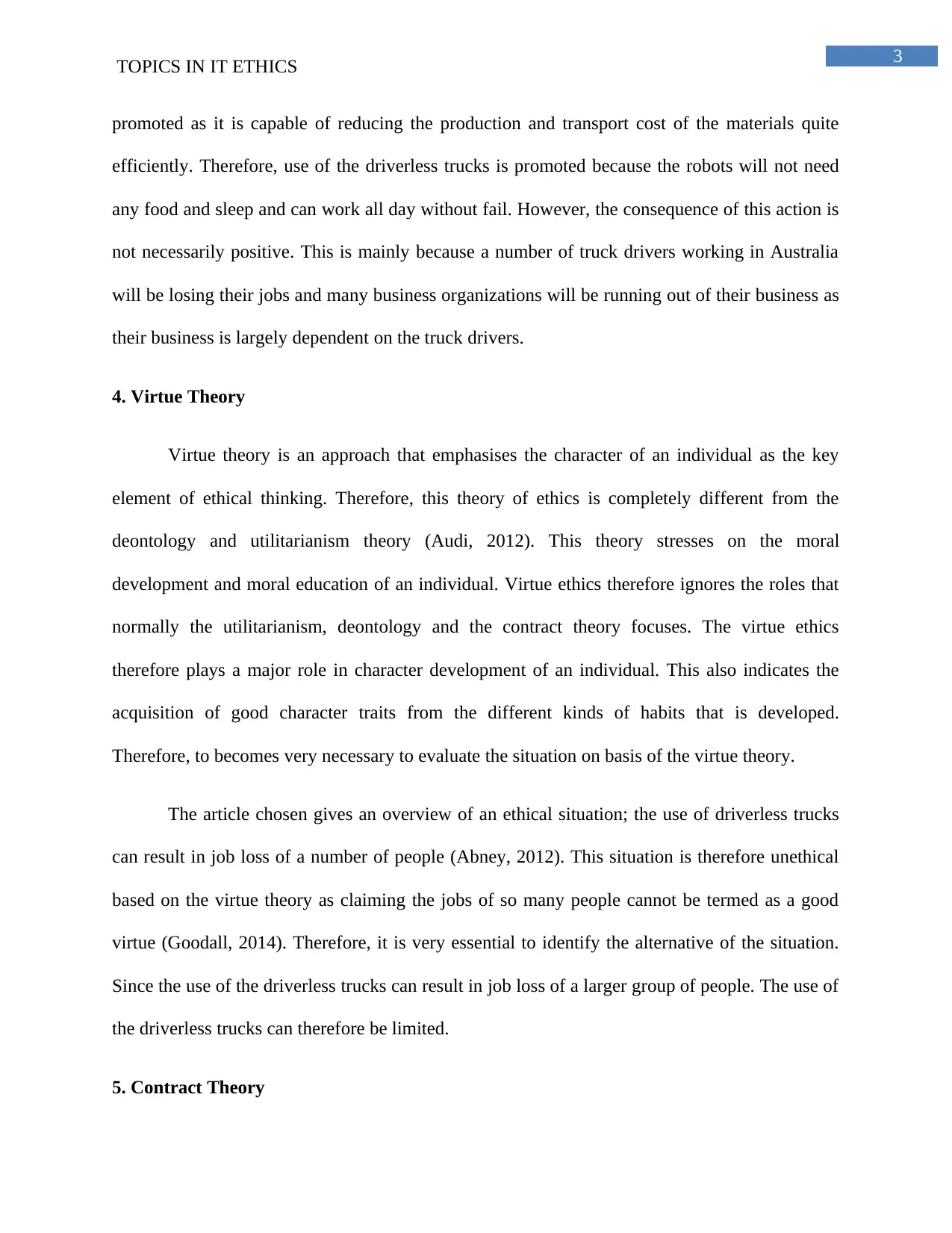
3
TOPICS IN IT ETHICS
promoted as it is capable of reducing the production and transport cost of the materials quite
efficiently. Therefore, use of the driverless trucks is promoted because the robots will not need
any food and sleep and can work all day without fail. However, the consequence of this action is
not necessarily positive. This is mainly because a number of truck drivers working in Australia
will be losing their jobs and many business organizations will be running out of their business as
their business is largely dependent on the truck drivers.
4. Virtue Theory
Virtue theory is an approach that emphasises the character of an individual as the key
element of ethical thinking. Therefore, this theory of ethics is completely different from the
deontology and utilitarianism theory (Audi, 2012). This theory stresses on the moral
development and moral education of an individual. Virtue ethics therefore ignores the roles that
normally the utilitarianism, deontology and the contract theory focuses. The virtue ethics
therefore plays a major role in character development of an individual. This also indicates the
acquisition of good character traits from the different kinds of habits that is developed.
Therefore, to becomes very necessary to evaluate the situation on basis of the virtue theory.
The article chosen gives an overview of an ethical situation; the use of driverless trucks
can result in job loss of a number of people (Abney, 2012). This situation is therefore unethical
based on the virtue theory as claiming the jobs of so many people cannot be termed as a good
virtue (Goodall, 2014). Therefore, it is very essential to identify the alternative of the situation.
Since the use of the driverless trucks can result in job loss of a larger group of people. The use of
the driverless trucks can therefore be limited.
5. Contract Theory
TOPICS IN IT ETHICS
promoted as it is capable of reducing the production and transport cost of the materials quite
efficiently. Therefore, use of the driverless trucks is promoted because the robots will not need
any food and sleep and can work all day without fail. However, the consequence of this action is
not necessarily positive. This is mainly because a number of truck drivers working in Australia
will be losing their jobs and many business organizations will be running out of their business as
their business is largely dependent on the truck drivers.
4. Virtue Theory
Virtue theory is an approach that emphasises the character of an individual as the key
element of ethical thinking. Therefore, this theory of ethics is completely different from the
deontology and utilitarianism theory (Audi, 2012). This theory stresses on the moral
development and moral education of an individual. Virtue ethics therefore ignores the roles that
normally the utilitarianism, deontology and the contract theory focuses. The virtue ethics
therefore plays a major role in character development of an individual. This also indicates the
acquisition of good character traits from the different kinds of habits that is developed.
Therefore, to becomes very necessary to evaluate the situation on basis of the virtue theory.
The article chosen gives an overview of an ethical situation; the use of driverless trucks
can result in job loss of a number of people (Abney, 2012). This situation is therefore unethical
based on the virtue theory as claiming the jobs of so many people cannot be termed as a good
virtue (Goodall, 2014). Therefore, it is very essential to identify the alternative of the situation.
Since the use of the driverless trucks can result in job loss of a larger group of people. The use of
the driverless trucks can therefore be limited.
5. Contract Theory
Paraphrase This Document
Need a fresh take? Get an instant paraphrase of this document with our AI Paraphraser
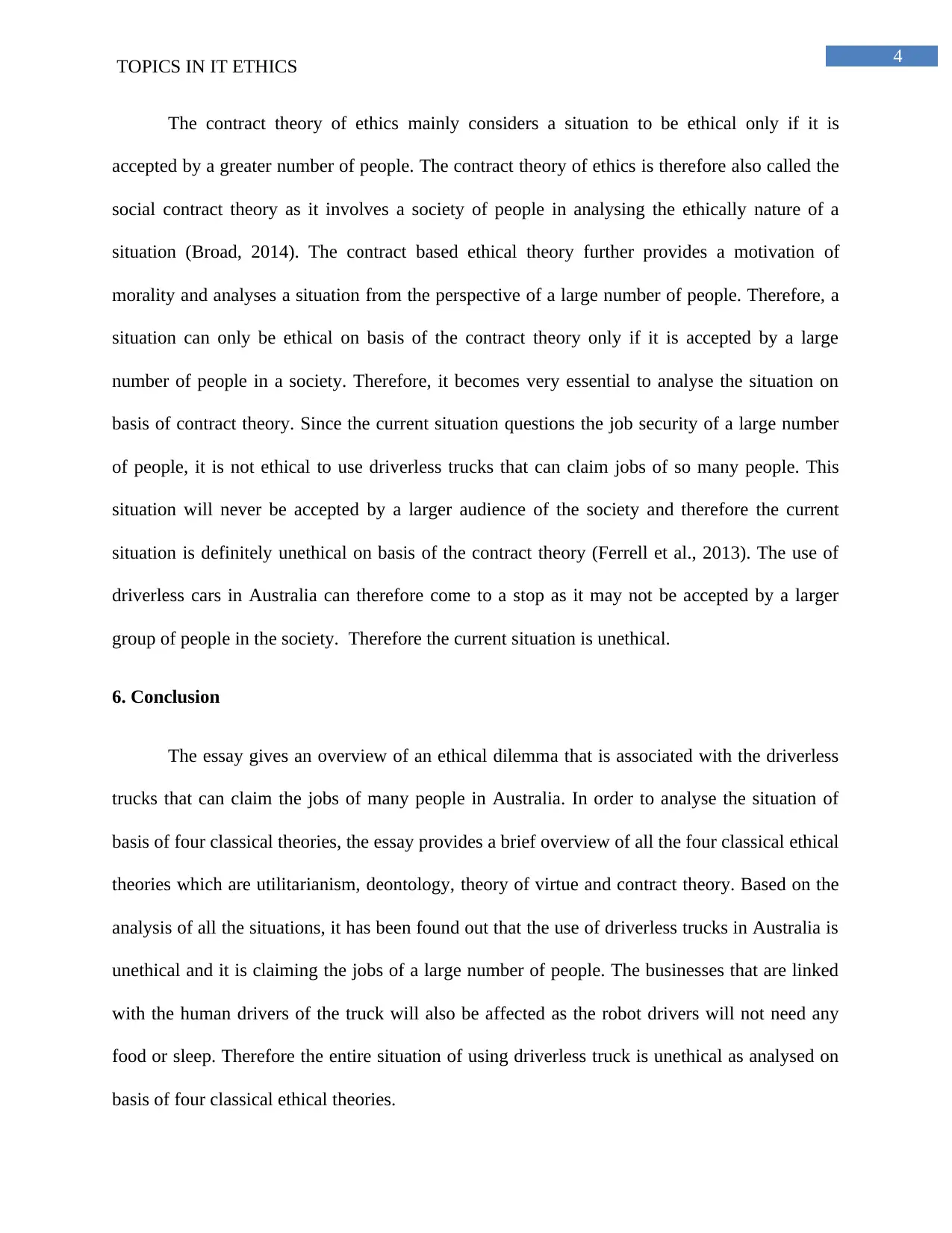
4
TOPICS IN IT ETHICS
The contract theory of ethics mainly considers a situation to be ethical only if it is
accepted by a greater number of people. The contract theory of ethics is therefore also called the
social contract theory as it involves a society of people in analysing the ethically nature of a
situation (Broad, 2014). The contract based ethical theory further provides a motivation of
morality and analyses a situation from the perspective of a large number of people. Therefore, a
situation can only be ethical on basis of the contract theory only if it is accepted by a large
number of people in a society. Therefore, it becomes very essential to analyse the situation on
basis of contract theory. Since the current situation questions the job security of a large number
of people, it is not ethical to use driverless trucks that can claim jobs of so many people. This
situation will never be accepted by a larger audience of the society and therefore the current
situation is definitely unethical on basis of the contract theory (Ferrell et al., 2013). The use of
driverless cars in Australia can therefore come to a stop as it may not be accepted by a larger
group of people in the society. Therefore the current situation is unethical.
6. Conclusion
The essay gives an overview of an ethical dilemma that is associated with the driverless
trucks that can claim the jobs of many people in Australia. In order to analyse the situation of
basis of four classical theories, the essay provides a brief overview of all the four classical ethical
theories which are utilitarianism, deontology, theory of virtue and contract theory. Based on the
analysis of all the situations, it has been found out that the use of driverless trucks in Australia is
unethical and it is claiming the jobs of a large number of people. The businesses that are linked
with the human drivers of the truck will also be affected as the robot drivers will not need any
food or sleep. Therefore the entire situation of using driverless truck is unethical as analysed on
basis of four classical ethical theories.
TOPICS IN IT ETHICS
The contract theory of ethics mainly considers a situation to be ethical only if it is
accepted by a greater number of people. The contract theory of ethics is therefore also called the
social contract theory as it involves a society of people in analysing the ethically nature of a
situation (Broad, 2014). The contract based ethical theory further provides a motivation of
morality and analyses a situation from the perspective of a large number of people. Therefore, a
situation can only be ethical on basis of the contract theory only if it is accepted by a large
number of people in a society. Therefore, it becomes very essential to analyse the situation on
basis of contract theory. Since the current situation questions the job security of a large number
of people, it is not ethical to use driverless trucks that can claim jobs of so many people. This
situation will never be accepted by a larger audience of the society and therefore the current
situation is definitely unethical on basis of the contract theory (Ferrell et al., 2013). The use of
driverless cars in Australia can therefore come to a stop as it may not be accepted by a larger
group of people in the society. Therefore the current situation is unethical.
6. Conclusion
The essay gives an overview of an ethical dilemma that is associated with the driverless
trucks that can claim the jobs of many people in Australia. In order to analyse the situation of
basis of four classical theories, the essay provides a brief overview of all the four classical ethical
theories which are utilitarianism, deontology, theory of virtue and contract theory. Based on the
analysis of all the situations, it has been found out that the use of driverless trucks in Australia is
unethical and it is claiming the jobs of a large number of people. The businesses that are linked
with the human drivers of the truck will also be affected as the robot drivers will not need any
food or sleep. Therefore the entire situation of using driverless truck is unethical as analysed on
basis of four classical ethical theories.
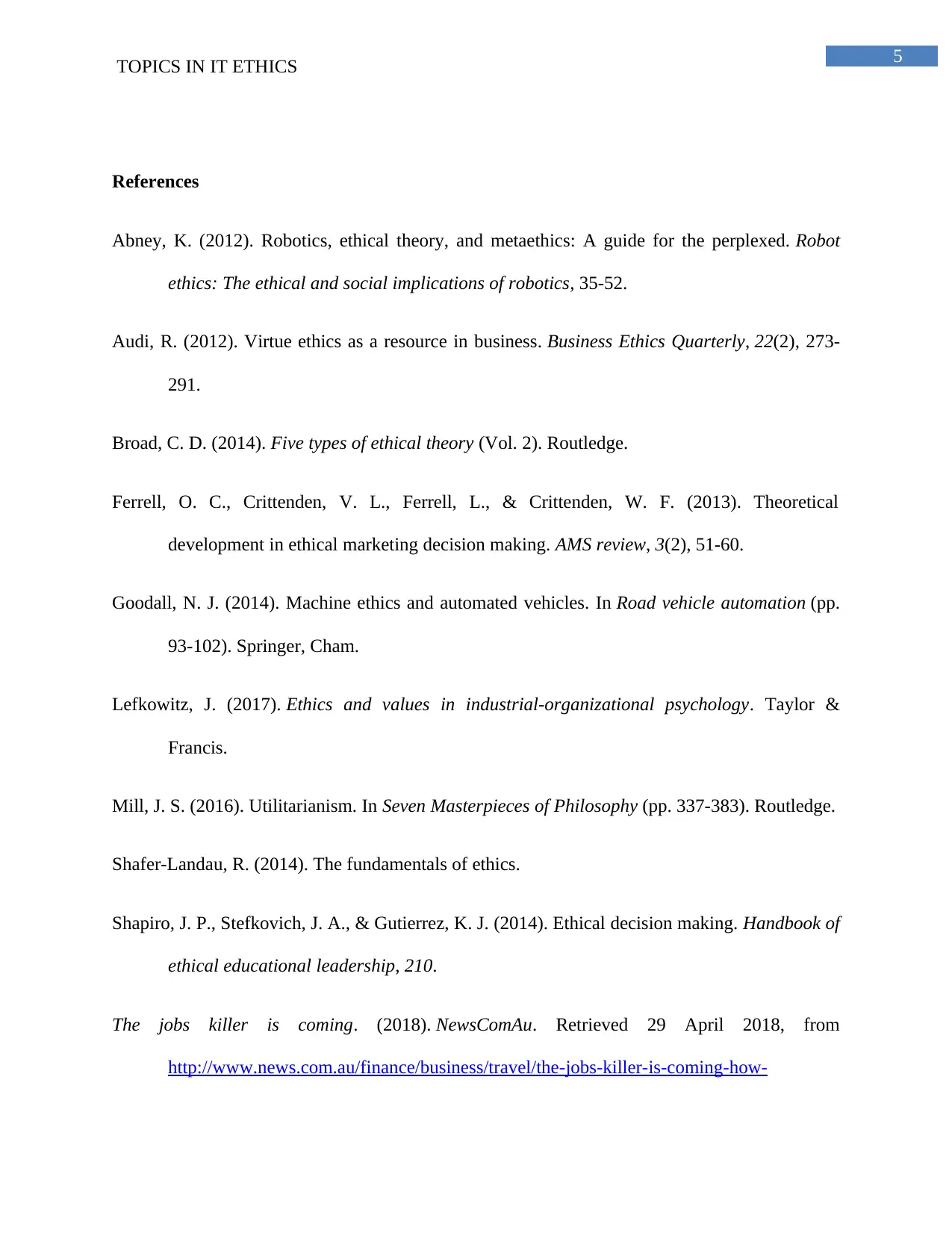
5
TOPICS IN IT ETHICS
References
Abney, K. (2012). Robotics, ethical theory, and metaethics: A guide for the perplexed. Robot
ethics: The ethical and social implications of robotics, 35-52.
Audi, R. (2012). Virtue ethics as a resource in business. Business Ethics Quarterly, 22(2), 273-
291.
Broad, C. D. (2014). Five types of ethical theory (Vol. 2). Routledge.
Ferrell, O. C., Crittenden, V. L., Ferrell, L., & Crittenden, W. F. (2013). Theoretical
development in ethical marketing decision making. AMS review, 3(2), 51-60.
Goodall, N. J. (2014). Machine ethics and automated vehicles. In Road vehicle automation (pp.
93-102). Springer, Cham.
Lefkowitz, J. (2017). Ethics and values in industrial-organizational psychology. Taylor &
Francis.
Mill, J. S. (2016). Utilitarianism. In Seven Masterpieces of Philosophy (pp. 337-383). Routledge.
Shafer-Landau, R. (2014). The fundamentals of ethics.
Shapiro, J. P., Stefkovich, J. A., & Gutierrez, K. J. (2014). Ethical decision making. Handbook of
ethical educational leadership, 210.
The jobs killer is coming. (2018). NewsComAu. Retrieved 29 April 2018, from
http://www.news.com.au/finance/business/travel/the-jobs-killer-is-coming-how-
TOPICS IN IT ETHICS
References
Abney, K. (2012). Robotics, ethical theory, and metaethics: A guide for the perplexed. Robot
ethics: The ethical and social implications of robotics, 35-52.
Audi, R. (2012). Virtue ethics as a resource in business. Business Ethics Quarterly, 22(2), 273-
291.
Broad, C. D. (2014). Five types of ethical theory (Vol. 2). Routledge.
Ferrell, O. C., Crittenden, V. L., Ferrell, L., & Crittenden, W. F. (2013). Theoretical
development in ethical marketing decision making. AMS review, 3(2), 51-60.
Goodall, N. J. (2014). Machine ethics and automated vehicles. In Road vehicle automation (pp.
93-102). Springer, Cham.
Lefkowitz, J. (2017). Ethics and values in industrial-organizational psychology. Taylor &
Francis.
Mill, J. S. (2016). Utilitarianism. In Seven Masterpieces of Philosophy (pp. 337-383). Routledge.
Shafer-Landau, R. (2014). The fundamentals of ethics.
Shapiro, J. P., Stefkovich, J. A., & Gutierrez, K. J. (2014). Ethical decision making. Handbook of
ethical educational leadership, 210.
The jobs killer is coming. (2018). NewsComAu. Retrieved 29 April 2018, from
http://www.news.com.au/finance/business/travel/the-jobs-killer-is-coming-how-
⊘ This is a preview!⊘
Do you want full access?
Subscribe today to unlock all pages.

Trusted by 1+ million students worldwide

6
TOPICS IN IT ETHICS
driverless-trucks-could-change-australia/news-story/
4f5b8a42b0452703d62e00f3e7644d7b
TOPICS IN IT ETHICS
driverless-trucks-could-change-australia/news-story/
4f5b8a42b0452703d62e00f3e7644d7b
1 out of 7
Related Documents
Your All-in-One AI-Powered Toolkit for Academic Success.
+13062052269
info@desklib.com
Available 24*7 on WhatsApp / Email
![[object Object]](/_next/static/media/star-bottom.7253800d.svg)
Unlock your academic potential
Copyright © 2020–2026 A2Z Services. All Rights Reserved. Developed and managed by ZUCOL.





